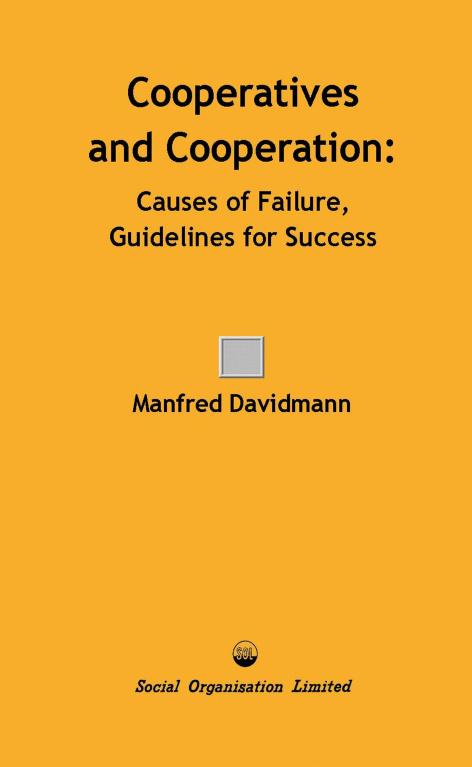Welcome to
Books by Manfred Davidmann

Books relevant to today's problems
Other Subjects;
Other Publications
Cooperatives and Cooperation:
Causes of Failure, Guidelines for Success

| When people are exploited and oppressed they cooperate with each other to escape from poverty, to overcome exploitation and oppression. As do people wishing to improve working conditions and the quality of their lives. They get together and form cooperatives. |
||
| Different forms of cooperatives tackle different kinds of problems. What they have in common is that they serve their members and the community, aiming to improve the quality of life for their members. |
||
| As a matter of principle, all profit (surplus) made by a cooperative or mutual society belongs to its members as individuals. Any profit which is retained and added to reserves is the total of amounts which in effect were deducted from the profit share of each individual member. |
||
| This book is based on a series of eight studies of cooperatives and mutual societies which were undertaken to determine causes of failure and reasons for success, to see how these enterprises were controlled and managed, to learn from their mistakes. |
||
| Its conclusions and recommendations are relevant and cover fundamental and practical problems of coops and mutual societies, of members, of direction, management and control. |
||
| Manfred Davidmann showed with these case studies that, for example, coops and mutual societies retain much of the profits and that their members then cease to be entitled to them. |
||
| The main chapter headings are: |
||
| 2 | Cooperatives and Cooperation | |
| 3 | Causes of Failure, Guidelines for Success | |
| 4 | Work and Pay | |
| 5 | Individual Case Studies | |
| 5.1 | Trustee Savings Bank Give-Away | |
| 5.2 | Credit Unions | |
| 5.3 | Building Societies | |
| 5.4 | Co-operative Retail Services Ltd | |
| 5.5 | Co-operative Wholesale Society Ltd
The Co-operative Bank PLC Co-operative Insurance Society Ltd |
|
| 5.6 | John Lewis Partnership PLC | |
| 5.7 | Mondragon Co-operatives | |
| 5.8 | Kibbutzim (Plural of 'kibbutz') | |
| 6 | Using Words to Communicate Effectively | |
| ISBN 978-0-85192-056-6 Paperback 200 pages GBP 18.00 |
||
| Order Book |
||
To list of Other Books
Copyright © 2011 Manfred Davidmann All rights reserved worldwide.
Updated 2021